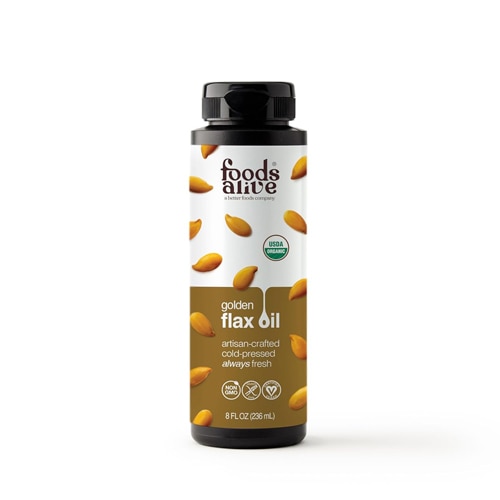Omegas, especially omega-3s, are associated with a seemingly endless array of health benefits, from supporting mood and focus to promoting joint and lung health to relieving menstrual pain. And of course, there’s the big kahuna: supporting heart and cardiovascular health.†
It’s also big business. The omega-3 supplements industry is projected to clock in at 57 billion in 2025 and currently hovers around 33 billion. According to CNN, fish oil is the third most widely used supplement in the United States. A National Institutes of Health study estimated that 7.8 percent of Americans used fish oils in 2012, although other studies suggest that number may be more than double.
And while numerous studies will say that adding fish to your diet is a healthy move, the benefits of isolating fish oil into a capsule or liquid is the subject of much debate. As the research continues to wax and wane, here’s what you need to know to stay in the loop.
Omega Definition List
Omega-3
Omega-3 fatty acids are defined as polyunsaturated fats—a type of fat your body can't make but is critical for your health.†
Omega-6
Like omega-3 fatty acids, omega-6 fatty acids are polyunsaturated fatty acids, but this omega has a different function and effect. Its primarily used for energy. Western diets tend to be deficient in omega-3 fatty acids but have excessive amounts of omega-6. According to Healthline, “the recommended ratio of omega-6 to omega-3 fatty acids in the diet is 4:1 or less. However, the Western diet has a ratio between 10:1 and 50:1.” Too much omega-6s can increase the risk of inflammation.
Omega-9
Omega-9 fats are not essential—they can be produced by the body. In fact, they are the most abundant fat in our cells. Even so, consuming omega-9 fats instead of saturated fats may be another way to reduce inflammation. Oleic acid is the most common omega-9 fatty acid and the most common monounsaturated fatty acid in the diet.†
Fatty fish and oily fish
Also called oily fish, fatty fish are the prime sources of two of the three most important omega-3s (EPA and DHA, with the third being ALA). fatty acids are considered the good fats, unlike the bad saturated fats in meat. Research attributes fatty acids with delivering health benefits for your heart, brain, lungs and circulation.† Here is a list of common fatty fish: trout, salmon, sardines, pilchards, kippers, eels, whitebait, mackerel, herring and tuna.
Fish oil
Fish oil, many people’s go-to dietary supplement, offers the motherlode of omega-3 fatty acids.
Algal oil
Derived from various types of seaweed, algal oil is a viable choice for vegans and other people who want a source of long-chain omega-3 fatty acids (EPA and DHA) but don’t want to get them from fish or fish-oil supplements. Algal oil is a more sustainable alternative to harvesting fish for their oil. It also poses minimal risk of contamination with pollutants, such as PCBs, that tend to be found in many fatty fish.
Flaxseed oil
Flaxseed oil contains the omega-3 fatty acid ALA (alpha-linolenic acid) -- a very small percentage of which is converted into EPA and, to a lesser extent, DHA in the body. Fish oil and flaxseed oil each provide omega-3 fatty acids, but only fish oil contains the omega-3s EPA and DHA.
Krill oil
Krill oil and fish oil supplements are two sources of omega-3 fatty acids including DHA and EPA. While oil from both krill and fish provide health benefits, their origin, price and benefits may differ. Krill oil, with its trademark red color, comes from a small, shrimp-like animal called krill. Krill oil, which contains more antioxidants than straight up fish oil, is usually more expensive.
DHA/EPA
These two fatty acids found in fish, eicosapentaenoic acid (EPA) and docosahexaenoic acid (DHA), are believed to benefit the cardiovascular system along with joint health, bowel health and mood.†
ALA
ALA (alpha-linolenic acid), another omega-3 fatty acid, is found in plant sources such as nuts and seeds.
GLA and dGLA
Gamma linolenic acid, an omega-6 fatty acid is found in various plant seed oils such as corn, safflower, and soybean oils as well as borage oil and evening primrose oil. The body converts gamma linolenic acid to a substance called DGLA that fights inflammation.†
CLA
Conjugated linoleic acid, another omega-6 fatty acid, as a supplement is typically used for weight loss, bodybuilding and diabetes. The main dietary sources of CLA are dairy products and beef. Although it’s not conclusive, some studies link this particular fatty acid, technically a healthy version of trans fats, to a lower risk of certain diseases.†
Essential fatty acids
Linoleic acid (LA), an omega-6 fatty acid, and ?-linolenic acid (ALA), an omega-3 fatty acid, are considered essential fatty acids (EFA) because our bodies can’t make them.
†These statements have not been approved by the Food and Drug Administration. These products are not intended to diagnose, treat, cure or prevent disease.




